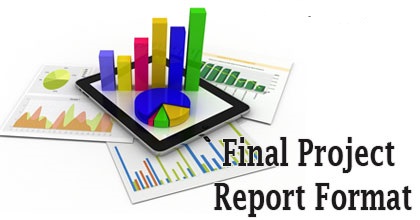![]()
Final Project Report

A final project report in project management is a comprehensive document that provides a detailed overview of a completed project.
It summarizes the project’s objectives, activities, outcomes, and lessons learned. The report typically includes the following key sections:
1. Executive Summary:
A concise summary of the project, highlighting its key achievements, deliverables, and outcomes. The executive summary provides a high-level overview of the project for stakeholders who may not have time to read the entire report.
2. Introduction:
An introduction to the project, including its background, objectives, and scope. This section provides context for the reader and sets the stage for the rest of the report.
3. Project Overview:
A detailed description of the project, including its purpose, timeline, budget, and resources allocated. This section provides an overview of the project’s key components and serves as a reference point for the subsequent sections.
4. Project Deliverables:
A list and description of the deliverables produced throughout the project’s lifecycle. This includes tangible outputs, such as reports, prototypes, or systems, as well as intangible outcomes, such as increased customer satisfaction or improved processes.
5. Project Methodology:
An explanation of the project management methodologies, techniques, and tools used to plan, execute, and monitor the project. This section outlines the approach taken to manage the project, including the project management framework, processes, and key activities.
6. Project Timeline:
A visual representation of the project timeline, showcasing the major milestones, activities, and their corresponding dates. This helps stakeholders understand the project’s progress and duration.
7. Project Budget and Expenditures:
An overview of the project’s budget, including the initial estimated budget and any changes or deviations during the project. This section highlights the actual expenditures, cost variances, and any financial considerations.
8. Project Performance:
An assessment of the project’s performance against the predefined metrics and objectives. This includes an analysis of the project’s schedule adherence, budget utilization, quality of deliverables, and stakeholder satisfaction.
9. Project Risks and Issues:
An identification and analysis of the risks and issues encountered during the project, along with the mitigation strategies employed. This section highlights any challenges faced and how they were addressed to ensure successful project completion.
10. Lessons Learned:
A reflection on the lessons learned from the project, including both successes and areas for improvement. This section provides insights into what worked well and what could be done differently in future projects.
11. Conclusion:
A concise summary of the project’s outcomes, achievements, and overall success. This section reiterates the project’s value and its contribution to the organization’s goals.
12. Recommendations:
Concrete recommendations for future projects or initiatives based on the lessons learned and experiences gained from the current project. This section provides actionable insights and suggestions to guide future project management practices.
The final project report serves as a valuable reference for stakeholders, enabling them to assess the project’s success, learn from its outcomes, and make informed decisions for future projects. It documents the project’s journey, outcomes, and lessons learned, providing a foundation for continuous improvement and knowledge sharing within the organization.
For more information, visit this site: https://www.incometax.gov.in/

For further details access our website https://vibrantfinserv.com